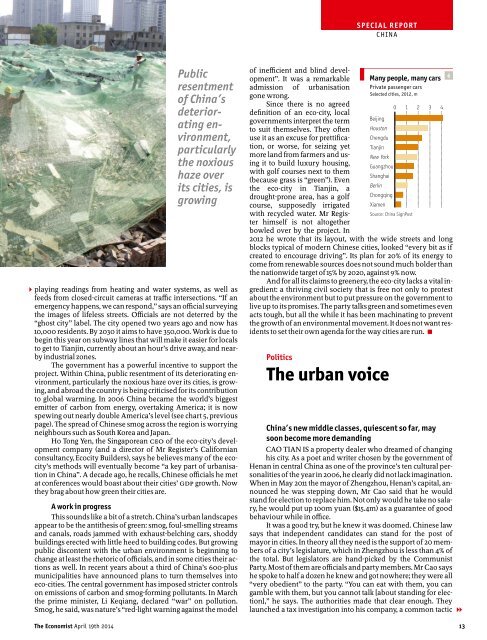The Economist - 19_25 April 2014
The Economist - 19_25 April 2014
The Economist - 19_25 April 2014
- No tags were found...
Create successful ePaper yourself
Turn your PDF publications into a flip-book with our unique Google optimized e-Paper software.
SPECIAL REPORTCHINA2Publicresentmentof China’sdeterioratingenvironment,particularlythe noxioushaze overits cities, isgrowingplaying readings from heating and water systems, as well asfeeds from closed-circuit cameras at traffic intersections. “If anemergency happens, we can respond,” says an official surveyingthe images of lifeless streets. Officials are not deterred by the“ghost city” label. <strong>The</strong> city opened two years ago and now has10,000 residents. By 2030 it aims to have 350,000. Work is due tobegin this year on subway lines that will make it easier for localsto get to Tianjin, currently about an hour’s drive away, and nearbyindustrial zones.<strong>The</strong> government has a powerful incentive to support theproject. Within China, public resentment of its deteriorating environment,particularly the noxious haze over its cities, is growing,and abroad the country is being criticised for its contributionto global warming. In 2006 China became the world’s biggestemitter of carbon from energy, overtaking America; it is nowspewing out nearly double America’s level (see chart 5, previouspage). <strong>The</strong> spread of Chinese smog across the region is worryingneighbours such as South Korea and Japan.Ho Tong Yen, the Singaporean CEO of the eco-city’s developmentcompany (and a director of Mr Register’s Californianconsultancy, Ecocity Builders), says he believes many of the ecocity’smethods will eventually become “a key part of urbanisationin China”. A decade ago, he recalls, Chinese officials he metat conferences would boast about their cities’ GDP growth. Nowthey brag about how green their cities are.A work in progressThis sounds like a bit ofa stretch. China’s urban landscapesappear to be the antithesis of green: smog, foul-smelling streamsand canals, roads jammed with exhaust-belching cars, shoddybuildings erected with little heed to building codes. But growingpublic discontent with the urban environment is beginning tochange at least the rhetoric ofofficials, and in some cities theiractionsas well. In recent years about a third of China’s 600-plusmunicipalities have announced plans to turn themselves intoeco-cities. <strong>The</strong> central government has imposed stricter controlson emissions of carbon and smog-forming pollutants. In Marchthe prime minister, Li Keqiang, declared “war” on pollution.Smog, he said, was nature’s “red-light warning against the modelof inefficient and blind development”.It was a remarkableadmission of urbanisationgone wrong.Since there is no agreeddefinition of an eco-city, localgovernments interpret the termto suit themselves. <strong>The</strong>y oftenuse it as an excuse for prettification,or worse, for seizing yetmore land from farmers and usingit to build luxury housing,with golf courses next to them(because grass is “green”). Eventhe eco-city in Tianjin, adrought-prone area, has a golfcourse, supposedly irrigatedwith recycled water. Mr Registerhimself is not altogetherbowled over by the project. InMany people, many carsPrivate passenger carsSelected cities, 2012, mBeijingHoustonChengduTianjinNew YorkGuangzhouShanghaiBerlinChongqingXiamenSource: China SignPost0 1 2 3 42012 he wrote that its layout, with the wide streets and longblocks typical of modern Chinese cities, looked “every bit as ifcreated to encourage driving”. Its plan for 20% of its energy tocome from renewable sources does not sound much bolder thanthe nationwide target of15% by 2020, against 9% now.And forall its claims to greenery, the eco-city lacks a vital ingredient:a thriving civil society that is free not only to protestabout the environment but to put pressure on the government tolive up to its promises. <strong>The</strong> party talks green and sometimes evenacts tough, but all the while it has been machinating to preventthe growth ofan environmental movement. It does not want residentsto set their own agenda for the way cities are run. 7Politics<strong>The</strong> urban voiceChina’s new middle classes, quiescent so far, maysoon become more demandingCAO TIAN IS a property dealer who dreamed of changinghis city. As a poet and writer chosen by the government ofHenan in central China as one of the province’s ten cultural personalitiesofthe yearin 2006, he clearly did not lackimagination.When in May 2011 the mayor of Zhengzhou, Henan’s capital, announcedhe was stepping down, Mr Cao said that he wouldstand forelection to replace him. Not only would he take no salary,he would put up 100m yuan ($15.4m) as a guarantee of goodbehaviour while in office.It was a good try, but he knew it was doomed. Chinese lawsays that independent candidates can stand for the post ofmayor in cities. In theory all they need is the support of20 membersof a city’s legislature, which in Zhengzhou is less than 4% ofthe total. But legislators are hand-picked by the CommunistParty. Most ofthem are officials and party members. Mr Cao sayshe spoke to halfa dozen he knew and got nowhere; they were all“very obedient” to the party. “You can eat with them, you cangamble with them, but you cannot talk [about standing for election],”he says. <strong>The</strong> authorities made that clear enough. <strong>The</strong>ylaunched a tax investigation into his company, a common tactic 16<strong>The</strong> <strong>Economist</strong> <strong>April</strong> <strong>19</strong>th <strong>2014</strong> 13


